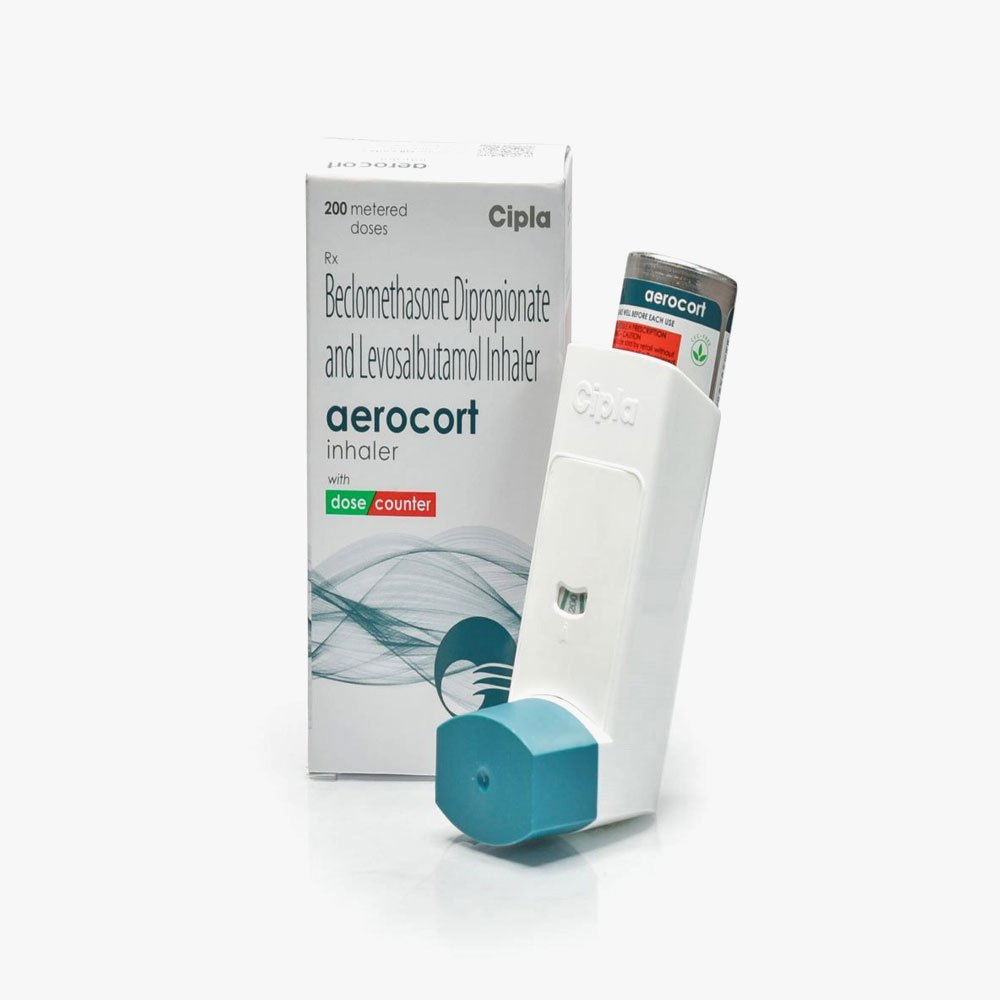AEROCORT INHALER 200MD
KEY BENIFITS,
- Bronchodilation: Levosalbutamol provides quick relief by dilating the airways, making breathing easier.
- Anti-Inflammatory: Beclometasone reduces inflammation in the airways, helping to control and prevent symptoms associated with respiratory conditions.
₹273.77
CompareProduct Introduction:
Aerocort Inhaler combines two active ingredients, Levosalbutamol (50mcg) and Beclometasone (50mcg). Levosalbutamol is a bronchodilator that helps relax and widen the airways in the lungs, while Beclometasone is a corticosteroid that reduces inflammation in the airways.
Your doctor will tell you how often you need to use your inhaler. It’s important that you take the lowest dose needed to effectively control your asthma. The effect of this medicine may be noticeable after a few days but will only reach its maximum after a few weeks. This medicine must be used regularly to be effective, so go on taking it even if you don’t have any symptoms. That means it’s doing its job. If you stop taking it your asthma may get worse. It should not be used to relieve sudden asthma attacks. If an asthma attack occurs, use your quick-relief inhaler (reliever). To get the benefit from this medicine you need to make sure you get your inhaler technique right, otherwise, it does not work as well.
The most common side effects are hoarseness of voice, sore throat, fungal infection of mouth, respiratory tract infection, headache, and muscle cramp. If you get these, don’t stop taking it but do talk to your doctor. You can help prevent some of these symptoms by rinsing your mouth and throat with water or brushing your teeth after using your inhaler. There are other, rarer side effects which can be serious. Talk to your doctor if you’re worried about them. In general, you should be trying to avoid situations that make your asthma worse (your triggers) and try not to smoke.
Ask your doctor whether it’s safe to take this medicine if you’re pregnant or breastfeeding. Before taking it, you should tell your doctor if you have any kidney or liver diseases so that your doctor can prescribe a suitable dose for you.
Benefits:
- Bronchodilation: Levosalbutamol provides quick relief by dilating the airways, making breathing easier.
- Anti-Inflammatory: Beclometasone reduces inflammation in the airways, helping to control and prevent symptoms associated with respiratory conditions.
Side Effects:
Common side effects may include throat irritation, headache, cough, and hoarseness. These side effects are usually mild and temporary. However, if you experience persistent or severe side effects, it’s essential to consult with your healthcare provider. Long-term use of corticosteroids may be associated with systemic side effects, so the medication should be used under medical supervision.
Usage Guidelines:
- Dosage: Follow the prescribed dosage and administration instructions provided by your healthcare professional.
- Inhaler Technique: Proper inhaler technique is crucial for optimal drug delivery. Ensure you are using the inhaler correctly and coordinate the inhalation with the actuation of the device.
- Rinse Mouth: After each use, rinse your mouth with water to minimize the risk of oral thrush.
- Consistency: Use the inhaler regularly, even if you are not experiencing symptoms, for the best results.
- Emergency Use: Have a rescue inhaler on hand for sudden symptoms or exacerbations, as recommended by your healthcare provider.
Drug Interactions:
Inform your healthcare provider about all medications you are taking, including prescription and over-the-counter drugs, as well as herbal supplements. Some medications may interact with Aerocort Inhaler, potentially affecting its efficacy or causing adverse effects. Common interactions may occur with other beta-agonists, corticosteroids, and certain antifungal medications.
Always consult with your healthcare professional for guidance specific to your health condition and medical history. They can provide comprehensive information about the benefits, risks, and proper usage of Aerocort Inhaler based on your individual needs.
SAFETY ADVICE

Alcohol

Pregnancy

Breast feeding

Driving

Kidney

Liver
| Weight | 0.5 kg |
|---|---|
| Dimensions | 10 × 10 × 10 cm |


